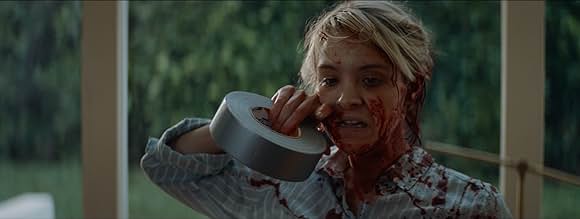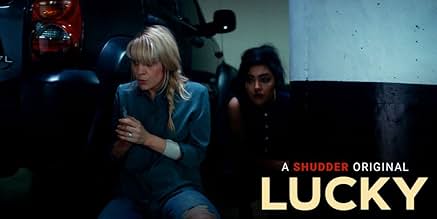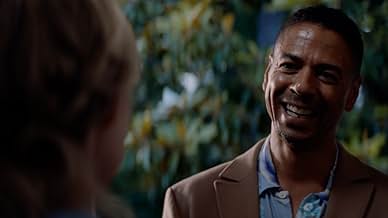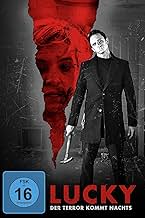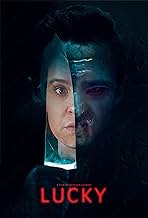AVALIAÇÃO DA IMDb
4,9/10
3 mil
SUA AVALIAÇÃO
Uma mulher luta para ser acreditada enquanto é perseguida por uma figura ameaçadora que retorna a sua casa noite após noite. Quando não consegue obter ajuda dos que a rodeiam, ela é forçada ... Ler tudoUma mulher luta para ser acreditada enquanto é perseguida por uma figura ameaçadora que retorna a sua casa noite após noite. Quando não consegue obter ajuda dos que a rodeiam, ela é forçada a tomar as coisas em suas próprias mãos.Uma mulher luta para ser acreditada enquanto é perseguida por uma figura ameaçadora que retorna a sua casa noite após noite. Quando não consegue obter ajuda dos que a rodeiam, ela é forçada a tomar as coisas em suas próprias mãos.
- Prêmios
- 1 indicação no total
Leith M. Burke
- Rob
- (as Leith Burke)
Nikea Gamby-Turner
- Detective
- (as Nikea Gamby Turner)
Avaliações em destaque
I really like the concept of this movie. I saw it described as kafka-esque and that's fair. I also especially appreciated the physicality of The Man--great slasher movie articulation. However, the movie's message is a mess. It's neither subtle or blatant in a consistent way, and I think it was meant be disorienting but mainly comes off as poorly hashed out. The main character is another weak part of the concept, made even more rough by the fact that she's portrayed by the film's writer, leaving little room to think it wasn't acted exactly as intended. May isn't likeable or smart, and portraying people trying to help (especially social workers) as useless and dumb isn't a great look. Also, muddling the luck-fear message with the (paraphrasing) "I'm not lucky, I'm great" insert line to the publisher was painful. Finding a solid publisher who will let it ride after your commonplace self-help book bombs is pretty lucky. All writers go through the process she rants about, and luck most certainly plays a part. Lucky isn't awful, but what I believe hurts it the most and contributed to the wealth of bad reviews is that it could have been a phenomenal film.
The killer mask is cheap. It has little horror effective elements. It is more psychological drama than horror movie. The cool mystery about the loop quickly disappeared. It was hard to care for the main character. I liked the first 20 minutes, and the last 20 minutes because there was finaly some progress. Didn't like the generalisation it gives about men. If you liked the 2019 version of Black Christmas, may be this one is for you.
Although this is billed as a thriller/horror film, I'd place it more in the category of Black Mirror or Twilight Zone in that it's a satire about the state of things in the world, told with surreal/absurd elements. For example there were themes of people being disbelieved, while holding to an every-person-for-themselves attitude, further preventing people from getting support. There's much more to it than that (gender and class) so I'm summarizing very briefly.
Other points: Some of the acting was stiff at times but that became an advantage during brief kafkaesque scenes of the protagonist attempting to communicate. With surreal elements, it often comes with the territory in any case. The music was minimal and rather than announcing everything that was about to happen, it left space for the imagination to fill in the blanks, only containing a few themes that repeated, along with a few key visual leitmotifs.
I can see how a person following this as a literal story with a straightforward protagonist might expect things to go differently, but I felt a definite tension leading up to the end, wondering how the director would play out the themes presented in the story. Perhaps intentionally on the part of the director, while I felt sympathy for the main character, I felt even more for a few of the side characters, especially toward the end of the movie.
Overall I enjoyed the movie, found the themes timely, and will look up other movies by this director.
Other points: Some of the acting was stiff at times but that became an advantage during brief kafkaesque scenes of the protagonist attempting to communicate. With surreal elements, it often comes with the territory in any case. The music was minimal and rather than announcing everything that was about to happen, it left space for the imagination to fill in the blanks, only containing a few themes that repeated, along with a few key visual leitmotifs.
I can see how a person following this as a literal story with a straightforward protagonist might expect things to go differently, but I felt a definite tension leading up to the end, wondering how the director would play out the themes presented in the story. Perhaps intentionally on the part of the director, while I felt sympathy for the main character, I felt even more for a few of the side characters, especially toward the end of the movie.
Overall I enjoyed the movie, found the themes timely, and will look up other movies by this director.
I appreciate directors and writers who try to do things a little differently to the constant identical horror movies we see everyday. And I like the fact we get presented with movies that aren't as straightforward as others. This movies reminds me of Mother! While I like the ideas behind the movies and trying to get people to think outside the box, the execution of these films needs to be a little tidier. They start off really interesting and as a viewer, you're really intrigued and excited....and then they just go to a weird place and don't come back, and you're sitting there thinking...'huh?'
There were several plot holes in this film and many things that were introduced were not explained at all. Not everyone who watched will be able to deduce certain clues brought up. It doesn't need to be a blatant in your face explanation that takes away from the mystery of the film, but it does need to be addressed in a way the viewer is like, 'ah, ok...I see what they did there.' It felt unfinished at 1hr 20mins. Could have packed a bit more in to wrap things up.
There were several plot holes in this film and many things that were introduced were not explained at all. Not everyone who watched will be able to deduce certain clues brought up. It doesn't need to be a blatant in your face explanation that takes away from the mystery of the film, but it does need to be addressed in a way the viewer is like, 'ah, ok...I see what they did there.' It felt unfinished at 1hr 20mins. Could have packed a bit more in to wrap things up.
Writer and protagonist Grant has something to say about violence against women-- something to say about the ways that some women are hobbled by fear of violence. Unfortunately, what Grant has to say is not clear.
Is Lucky a study on the meaningless surreality of some of these fears, that their focus is on some masked stranger in a parking garage rather than on one's husband, the vastly more likely source of violence? Or is Lucky instead arguing that those masked strangers are inappropriately disregarded as a legitimate source of fear? Does Lucky argue that women need to stick together to escape their chains? Or does it instead tell us that women should "Go It Alone" because solidarity is hopeless? When Grant angrily insists that her success is 100% a function of her hard work, are we as the audience supposed to be cheering for her self-regard or shaking our heads at her self-importance? Are we invited to think that all men (save our husbands, of course) are responsible for our fear, or are we instead asked if we're failing to see "Schrodinger's Rapist" as something other than an object-- a man with a face, many men with many faces?
Maybe Grant isn't sure about any of that, and Lucky is just asking a lot of questions. Maybe it's less of a manifesto, more of a meditation. But if so, even that uncertainty is unclear. Lucky merely allows us to be reminded of our own questions-- or of our own certainty regarding the answers-- and if we have none, then Lucky doesn't do anything to change that.
That might be okay sometimes. Like Inglorious Basterds, Lucky seems to be fine with you ignoring the critical questions. In Lucky's case, in favor of just watching a poppy, PG-13 thriller. Unfortunately, Lucky doesn't travel the traditional scales of pop. It is a thought experiment, with little relationship to reality, yet never embraces this, never surprises us with any genuine weirdness. Any transformation here is transient-- abandoned in the third act. And there is no reveal, no catharsis; the unmasking has no impact on the movie as a work of entertainment. There is no denouement. The plot questions are never answered.
But it's not poorly made: the acting is generally decent (although there are occasional awkward missteps); it's not overly long; the production values are good. Lucky may not hit the targets it aimed for, but it's an acceptable way to blow an hour and a half.
Is Lucky a study on the meaningless surreality of some of these fears, that their focus is on some masked stranger in a parking garage rather than on one's husband, the vastly more likely source of violence? Or is Lucky instead arguing that those masked strangers are inappropriately disregarded as a legitimate source of fear? Does Lucky argue that women need to stick together to escape their chains? Or does it instead tell us that women should "Go It Alone" because solidarity is hopeless? When Grant angrily insists that her success is 100% a function of her hard work, are we as the audience supposed to be cheering for her self-regard or shaking our heads at her self-importance? Are we invited to think that all men (save our husbands, of course) are responsible for our fear, or are we instead asked if we're failing to see "Schrodinger's Rapist" as something other than an object-- a man with a face, many men with many faces?
Maybe Grant isn't sure about any of that, and Lucky is just asking a lot of questions. Maybe it's less of a manifesto, more of a meditation. But if so, even that uncertainty is unclear. Lucky merely allows us to be reminded of our own questions-- or of our own certainty regarding the answers-- and if we have none, then Lucky doesn't do anything to change that.
That might be okay sometimes. Like Inglorious Basterds, Lucky seems to be fine with you ignoring the critical questions. In Lucky's case, in favor of just watching a poppy, PG-13 thriller. Unfortunately, Lucky doesn't travel the traditional scales of pop. It is a thought experiment, with little relationship to reality, yet never embraces this, never surprises us with any genuine weirdness. Any transformation here is transient-- abandoned in the third act. And there is no reveal, no catharsis; the unmasking has no impact on the movie as a work of entertainment. There is no denouement. The plot questions are never answered.
But it's not poorly made: the acting is generally decent (although there are occasional awkward missteps); it's not overly long; the production values are good. Lucky may not hit the targets it aimed for, but it's an acceptable way to blow an hour and a half.
Você sabia?
- Erros de gravaçãoAt 19:32, when May is talking to Ted's sister Sarah, her iPhone isn't compatible with the case she's using.
- ConexõesFeatured in Dead Meat Podcast: Interview with Brea Grant (2021)
- Trilhas sonorasSign of the Times
Written by Hannah Fairlight
Produced by Michael Wagener
Performed by Hannah Fairlight
Principais escolhas
Faça login para avaliar e ver a lista de recomendações personalizadas
- How long is Lucky?Fornecido pela Alexa
Detalhes
- Data de lançamento
- País de origem
- Central de atendimento oficial
- Idioma
- Também conhecido como
- Lucky
- Empresa de produção
- Consulte mais créditos da empresa na IMDbPro
- Tempo de duração1 hora 23 minutos
- Cor
- Proporção
- 2.39 : 1
Contribua para esta página
Sugerir uma alteração ou adicionar conteúdo ausente

Principal brecha
What is the Hindi language plot outline for Lucky - Uma Mulher de Sorte (2020)?
Responda


